When it comes to discussing medication, understanding side effects is crucial for anyone navigating their health journey. Many people underestimate the importance of sharing their experiences, which can lead to better insights for both patients and healthcare providers. By openly addressing the side effects of medications, we empower ourselves and others to make informed decisions about treatment options. Curious to learn more about how to effectively share your insights on medication side effects?

Patient Identification and Medical History
Patient identification is crucial for accurate medical assessments. It typically includes the patient's name, date of birth, and unique medical record number. Medical history encompasses critical information such as previous illnesses, allergies, and current prescriptions. Documenting side effects is essential for evaluating the safety and efficacy of newly prescribed medications, particularly those with known risks, such as antidepressants or antihypertensives. Systematically recording these reactions aids in identifying patterns that may necessitate adjustments in treatment plans. Health professionals often rely on comprehensive medical histories gathered during initial consultations to make informed decisions regarding medication management.
Detailed Description of Medication and Dosage
The medication, Sertraline, commonly prescribed for depression and anxiety disorders, is often administered in varying dosages, typically ranging from 50mg to 200mg daily. This selective serotonin reuptake inhibitor (SSRI) works by increasing serotonin levels in the brain, influencing mood and emotional regulation. Common side effects reported by users can include gastrointestinal disturbances such as nausea and diarrhea, with onset often occurring within the first week of treatment. Additional side effects may involve sleep issues, including insomnia (with estimates suggesting up to 30% of users experience this) or excessive drowsiness, sometimes affecting daily functioning. Other notable reactions involve weight fluctuations, both gain and loss, as well as potential sexual dysfunction, impacting around 40% of patients on SSRIs. It's crucial to monitor these effects closely and report any severe reactions to a healthcare provider for appropriate management and support.
Comprehensive List of Side Effects Experienced
Patients often report a range of side effects after initiating medication, which is vital for healthcare providers to monitor. Common side effects include nausea (often ranging from mild queasiness to severe discomfort), dizziness (which can lead to instability or faintness), and fatigue (significant tiredness affecting daily activities). Some patients experience gastrointestinal issues such as diarrhea (more than three loose stools per day), constipation (less than three stools per week), or abdominal pain (cramping or sharp pain). Other notable effects might include headaches (varying in intensity), sleep disturbances (insomnia or excessive sleepiness), and skin reactions (rashes, itching, or other dermatological issues). Additionally, psychological effects like anxiety or mood swings may occur. It is crucial to report these experiences accurately to allow for proper medical evaluation and adjustment of treatment plans.
Timeline and Duration of Side Effects
Medication side effects, such as gastrointestinal disturbances, can manifest within a specific timeline post-administration. Commonly, these discomforts appear within 24 to 48 hours of starting a new prescription, like statins for cholesterol management. In most instances, these side effects persist for a duration of 1 to 2 weeks, gradually diminishing as the body adjusts to the medication. Noteworthy side effects include fatigue, with reported instances affecting approximately 20% of patients within the first week. For more severe reactions, such as allergic responses, symptoms may surface within hours and require immediate medical intervention. Hence, understanding the timeline and duration of these side effects plays a crucial role in patient management and ensures timely communication with healthcare providers.
Recommendations for Monitoring and Adjustments
In assessing medication side effects, particularly for drugs like Sertraline (commonly prescribed for depression and anxiety), it is vital to monitor specific symptoms and effects closely. Patients may experience side effects such as nausea, fatigue, or insomnia within the first few weeks of treatment, especially at doses exceeding 100 mg. Regular follow-ups, ideally at intervals of two weeks, can help identify adverse reactions early on. Other medications, such as Metformin for diabetes management, could interact, leading to gastrointestinal discomfort or lactic acidosis in rare cases. Adjustments to dosages or switching to alternatives, including Escitalopram for mood stabilization with a potentially lower side effect profile, may be necessary based on individual tolerance levels. Engaging patients in conversation about their experiences with these medications promotes better outcomes and adherence to treatment plans.
Letter Template For Providing Review Of Medication Side Effects Samples
Letter template of medication side effects feedback for healthcare provider.
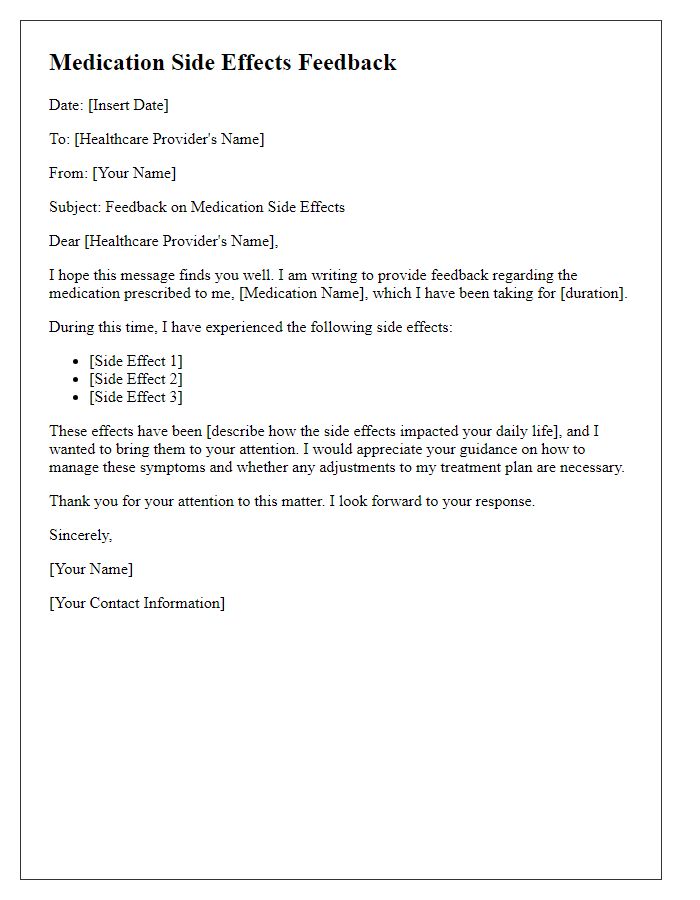
Letter template of patient-reported medication side effects for clinical assessment.
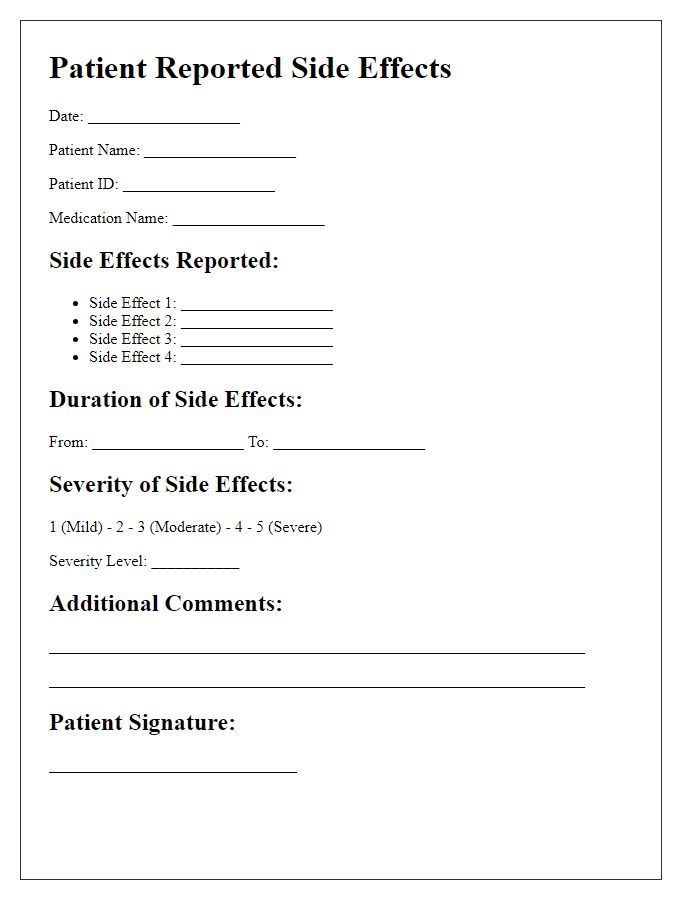
Letter template of detailing adverse reactions to prescribed medication.
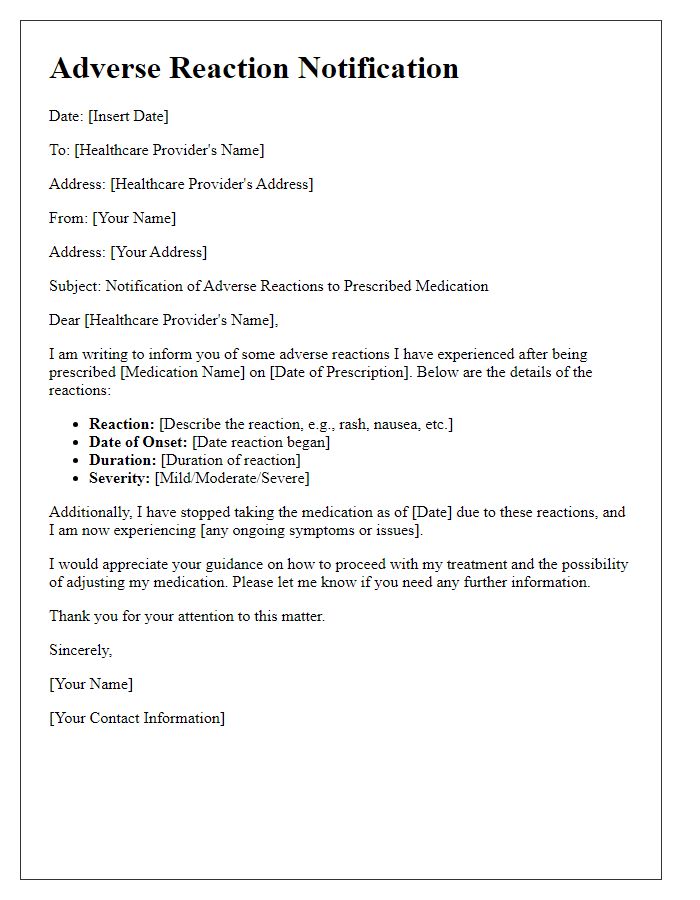
Letter template of documenting unexpected medication effects for prescription review.
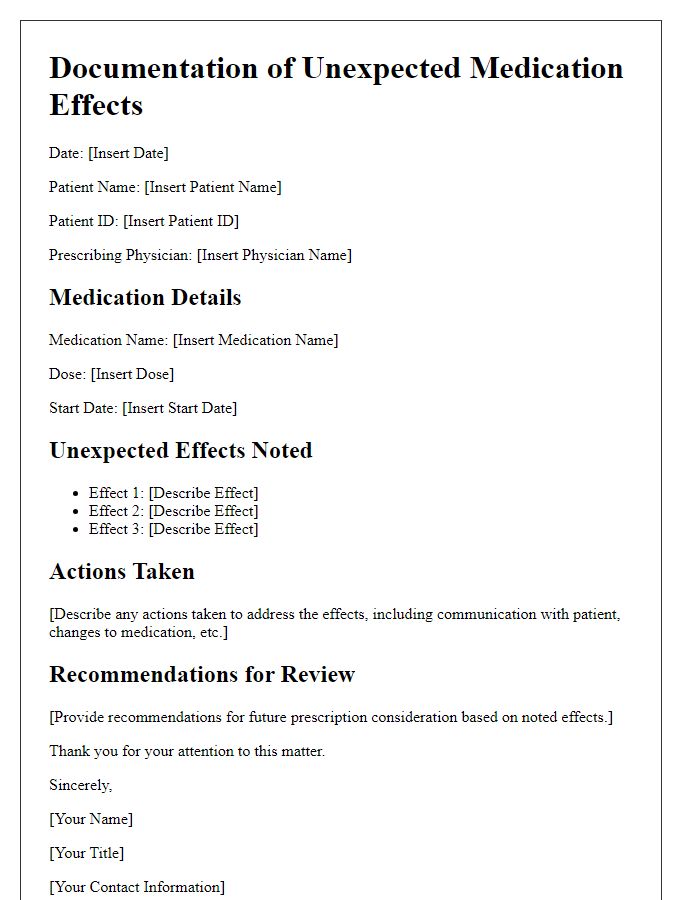
Letter template of communicating side effects to pharmacist for medication consultation.

Letter template of reporting medication side effects for patient safety monitoring.
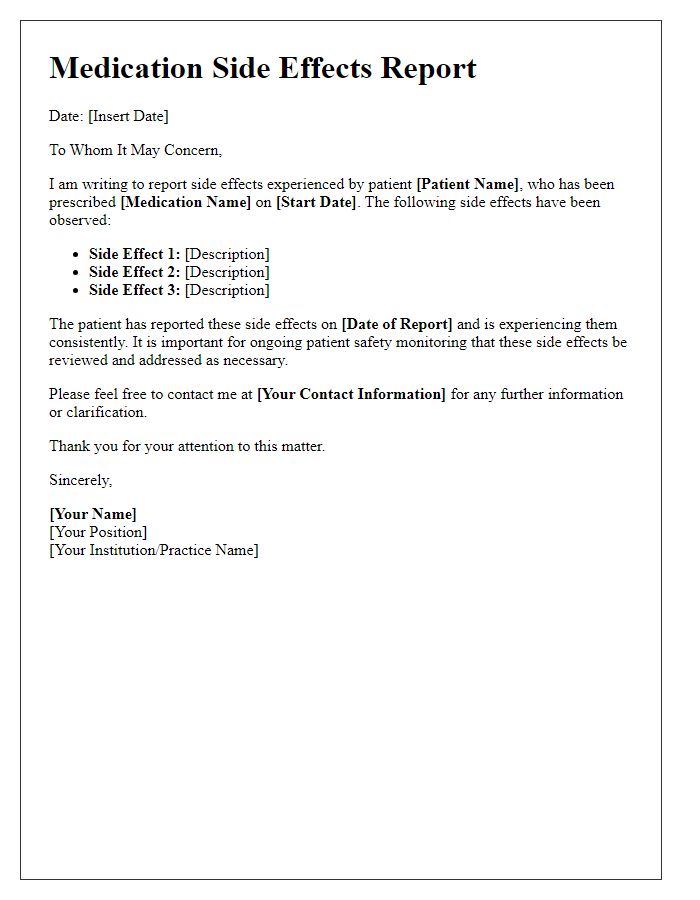
Letter template of summarizing negative reactions to ongoing medication therapy.
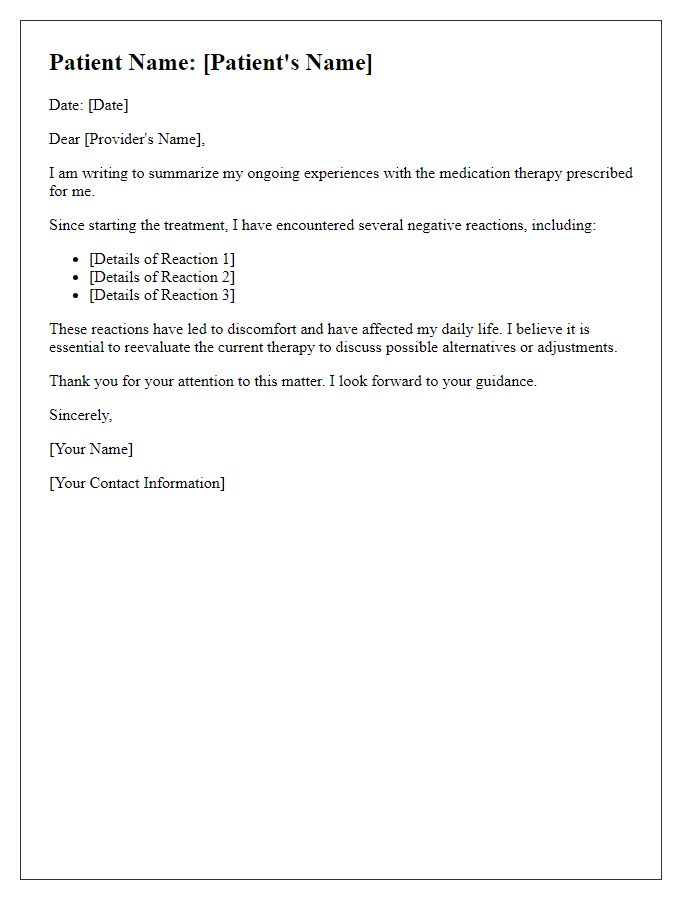
Letter template of expressing concerns about medication side effects to specialist.
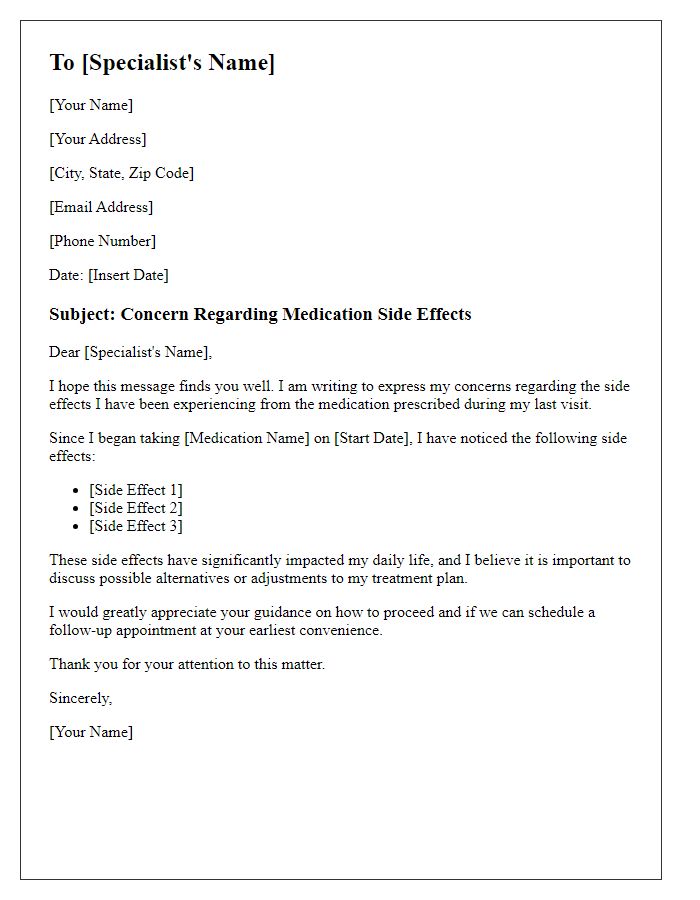
Letter template of outlining medication intolerance for follow-up treatment planning.
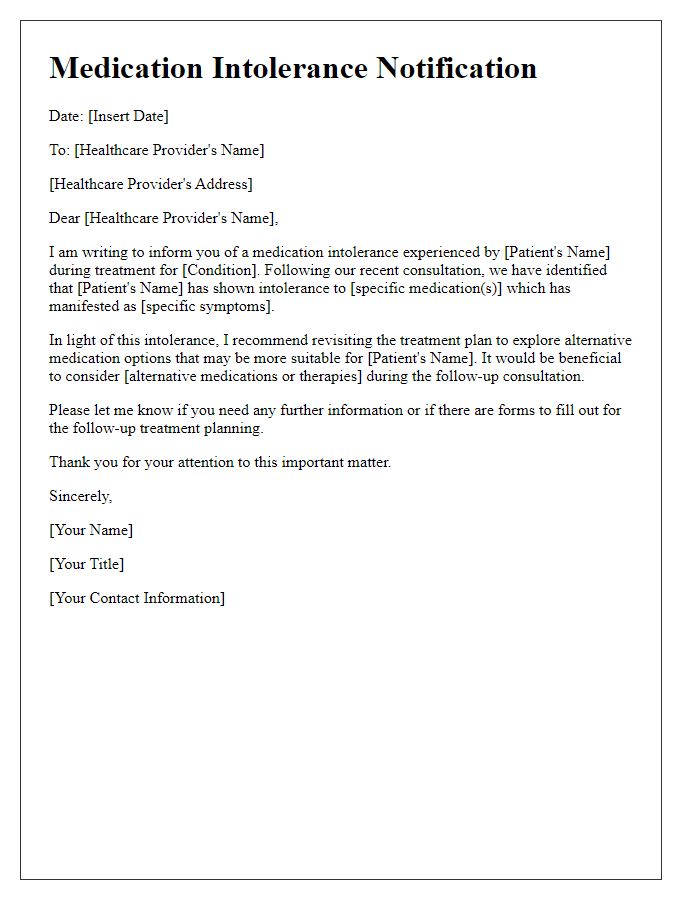

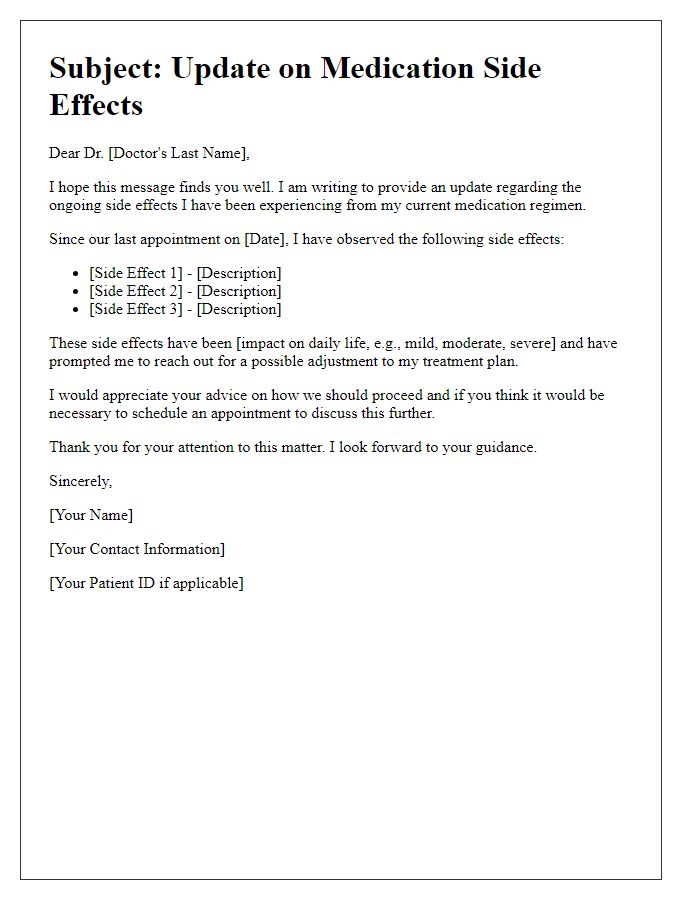


Comments